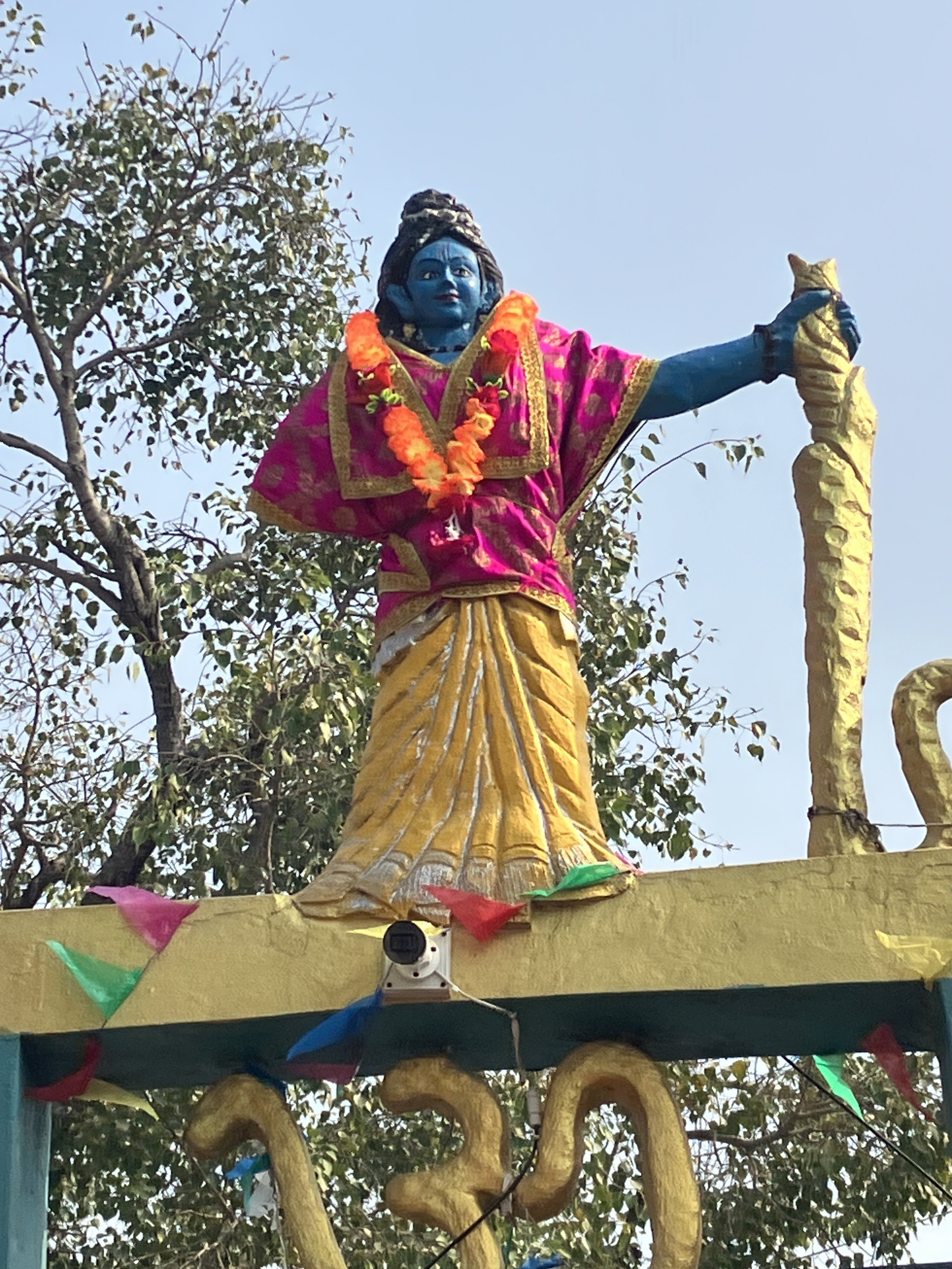Shranup Tandukar is a Poet, editor, and writer who has worked with international literary magazines and published in national and international publications. He also has experience working for different national and international journals, media houses, literary magazines, and art spaces and has participated in various local, national, and international literary workshops, seminars, and competitions.
1.
The best way to read about a city is by walking through
its roads, alleyways, narrow paths between houses
where you can peek into open windows and see life unfolding.
I know nothing about Janakpurdham and so, I walk—
2.
There is a story. A myth. A memory. A history. A khichadi of this and that. She met him and he met her and they met them and so on:
Once upon a time in a land where there were as many people as ponds and as many ponds as temples, a saint came from a distant land. He had heard of this magical place where everyone had achieved happiness. He went around asking everyone, why are you all so happy? They answered him, why not? All day he walked through every alleyway and peeked into every open window but he couldn’t find what he was looking for. In the evening, his exhausted body lets out a sigh and stretches beside a pond. On his neck was a pendant that shone golden with the dying rays of the evening sun. Some people were bathing in the pond. Children were laughing, women washing clothes. He wanted to take a dip in it as well. When he emerged from the waters that felt just warm enough, like an embrace, his neck felt lighter. The pendant was nowhere to be found. At night, he left the city heart-broken. Years later, in another land of light which had the holiest of rivers, he dipped into the river’s shores to rid his body of sins and found his neck heavier when he emerged.
3.
Two men on bikes try to drive through a wedding crowd, lost in conjugal reverie. Their horns as if perpetually in pain, blare and yet no one neither hears nor cares. I realize one thing about Janakpurdham: the city is alive, bursting, angry, joyous, insolent, impatient—the road beneath my feet blurs, turns into a pond sloshing inside a plastic bottle, leaning to the side where it’s tilted. A shopkeeper drapes an orange plastic tarp on the pavement and on top of it, puts idols, trinkets, posters of Sita&Ram on display. A row of bikes sit and sway along to the wedding music. Sometime during the night, the city must have gone to sleep because every morning, the city’s dreams appear as new murals on a wall of a random street.
4.
Nothing is being asked and yet we are here looking for a meaning of this place that exists nowhere else but in our memories. No other reason why people still come or remember us other than the trinity—fish, paan, makhana—everything is connected within these three things. Sun never sets inside our eyelids. If you have nothing to lose, you become fierce. If you have everything to lose, you can become free. The subaltern speak and no one listens because faith, by definition, transcends rationality. In the sanctum sanctorum of a temple thronged by a million devotees, you don’t have to die to be judged. Everything is a story—the vice, the virtue, and the body—the coherence between the three is what we seek. And I realize one thing about Janakpurdham: there are undercurrents of violence flowing beneath our feet. Before, they needed to bore thousands of feet underground to reach it and now it’s only 200 or even 50. If the will to dominate is a human failing, which one of us can rise above it?
5.
In the car on our way to Janakpurdham Chadani tells us about the hundreds and thousands of pilgrims that come to this city to witness the celebration of Sita and Ram sleeping under the open night air where Venus twinkles like a little child and pilgrims live sleep eat for a day or two and the city swells like a pregnant mother and the Ganga Sagar sees devotees cleanse the dirt from their body with its waters and so I am curious to see this pond this heart of the city pulsing with breath and I walk towards the pond slipping through wedding processions that never seem to end and at the pond are groups of boys vertically glued to their phones occasional gun sounds coming from their phones their eyes locked to the screen and bodies keep adding to the shores as priests bring out three statues to the piers and the catchy religious songs blasting through the speakers are replaced by hymns in Hindi and a line of women clad in red and yellow saris with clay pots filled with the pond’s water placed on their head linked with each other through a white cloth make their way from the shore to the the exit to pour the water onto the thirsty earth where a new house with echoes of children resounding with laughter will soon be built and again on the pond’s shore, a boy with a garland of marigold around his neck, his face stoic and concentrated, carries a palmful of water that he cups with both hands, his feet bare, from the pond to the outside where his body disappears between the crowds and a family sits just in front of the three piers, the mother, the father, the daughter and the mother wears a red and yellow bandana that has nothing but “ram ram ram ram” written again and again and she has come here after hours and hours on a packed bus that smelled of vomit and dank socks and sweat but that was over now and all that mattered was the aarti that she came all this way for and as soon as the three priests started the crowd that was now teeming was transfixed clapping singing praying and a boatsman on a blue liferaft could be heard saying as it ended, I promise you that if you come to hear the aarti two or three times you will feel something in your heart something will change in you.
6.
What happens when you meet the Other? The one who was the demon hiding in the shadows of your room, the villain in your mother’s bedtime stories, the ghost that chased you at night. What happens when the Other meets you?
7.
In Janakpurdham, the boy sleeps inside a small room. He knows the ins and outs of this city that feels distant almost reachable like the outline of a shore in a misty morning. Today he was driving when he got into a fight with another man on the road who raged and told him to go back to where he came from. If it had been his fault, he would have simply apologised and moved on. If he knew where he came from, he would have simply returned. Once, he spent days in a stupor lost in a trance of sounds that glimmered and lights that vibrated. He lost himself once and still he has been searching. You leave your house and your body, image, and identity is in flux. When his mother calls, he can hear his sisters’ laughter in the background.
8.
What is commonly seen is commonly lived.
On the temple premises, a tree sprouts wings. A woman strings a line from its torse to a metal pole. She hangs clothes—saris, shawls, shirts—newly washed and wrung to dry. I duck underneath it to pass by.









